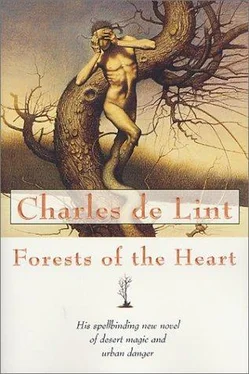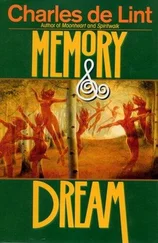Where would she find that kind of money? Everything she’d taken in had already been spent on supplies, rent, living expenses. And if she couldn’t get any more commissions…
“Shit.”
She looked across her studio at the line of portrait busts in various stages of completion on the back of her worktable. She felt like destroying them all, each and every one of them.
What was she doing anyway, taking all these commissions, doing work she didn’t even care about in the first place? When she compared them to the busts farther along the table of Donal and Sophie and other friends, it was like seeing the difference between night and day. That one of Tommy—she couldn’t wait to cast it. It was so individual, so Tommy. The commissioned portraits were all of a kind, almost interchangeable. Inoffensive and a little stiff, but safe. The ones of her friends, even the self-portrait, which she wasn’t all that fond of, were infinitely more interesting. Varied. Full of life and expression.
Her legs had stopped trembling, but she still had a shaky feeling inside, a pressure behind her eyes.
No, she wasn’t going to cry. She wouldn’t give piggy-eyed Henry Patterson that satisfaction. But what was she going to do?
What she should do was another bust of him, this time staying relentlessly faithful to his likeness. Do him with those bloated features and the bulbous nose, the flapping jowls, little piggy eyes and all. Then when Patterson took her to court, she could wheel it out as “Exhibit A.” She’d point at it, then at Patterson. “Your honor,” she’d say. “Ladies and gentlemen of the jury. Is it still defamation when all I have done is copy what nature has already provided?”
Better yet, take a great big lump of clay and drop it on his head from, oh say, the top of one of those buildings he owned downtown. Hide out on the roof, thirty stories up from the street, and just let it go, bombs away.
Yeah, right, she thought. I don’t think so.
She sighed and pushed herself up from the couch. What she really had to do was get out of here. She put on a pair of boots, collected her parka and knapsack, and left the studio to wander aimlessly through the wintered streets of Lower Crowsea. Anything to get in a better mood than this.
This being January in Newford, it wasn’t warm, not even close, but she didn’t mind so much today. The bite in the north wind helped clear her head, though after a while her forehead and temples got that feeling like an iced Slushie drunken too fast. She didn’t have the streets to herself either. A winter’s Saturday in the Market couldn’t compete with a busy summer weekend, but the streets were still crowded. What always surprised her was how not even the frigid temperatures could keep the itinerant vendors from selling their wares, everything from fresh vegetables—imported, of course—cut flowers and various maple syrup products, to clothing, antiques, and a surprising diversity of arts and crafts.
The fast-food carts braving the weather were doing a booming trade with line-ups four or five people deep. There were even some buskers out, though the two she saw were standing over hot-air grates in front of the old Keller-man’s Department Store. The long, brick building now housed a half-dozen smaller businesses, from a pawn shop on one end to a wonderful Italian grocery store on the other, with two restaurants, a gallery, and a used record store in between. One of the buskers was good—a Native fiddler playing those strange syncopated versions of Kickaha jigs and reels with their odd jumps where you felt a few notes were missing. The other was the inevitable folkie butchering Dylan and Crosby, Stills & Nash.
The shakiness that Ellie had suffered in the wake of her dispute with Patterson finally dissipated after a couple of hours of walking. All that remained was this sense of impending doom. The whole thing was so depressing. Not only the business with Patterson this morning, but how he might very well be able to scuttle what had developed into a fairly lucrative sideline for her. She’d worked hard to get the kind of commissions she was getting now and it wasn’t fair that he might be able to take it all away, just like that, with a wave of his hand and the flapping of his jowls.
She caught herself staring at the icy pavement as she walked along, not even paying attention anymore to all the flurry of life bustling around her.
Enough, she told herself. This is just letting Patterson win.
She looked up to find herself back on Lee Street once more, just across the street from the Rusty Lion where she spied Donal sitting at a table by himself in a window booth. He was reading a newspaper, the remains of either a late breakfast or an early lunch on his table. Crossing over the street, she went into the restaurant and made her way through the tables to where he was sitting.
“Were you saving this seat for me?” she asked.
Donal lowered the paper to look at her. “Jaysus, Ellie. You look worse than I usually feel.”
“Well, thank you for sharing that.”
“Sorry,” he said. “I didn’t mean it like that.” He folded his paper and set it aside on the padded seat beside him. “Sit down.”
“Thanks.”
Ellie sat down and signaled to the waiter. When she caught his eye, she pointed to Donal’s coffee mug.
“I’ve had a lousy morning,” she said, turning back to Donal.
“Welcome to my life. I’m still trying to air out from the deadly combination of Miki’s cigarettes and accordion, both of which she has to experience in excess before going in to work. But today’s worse, since she’s got the day off to get together a last-minute gig for tonight. So it’s going to be smoke and noise in the apartment, all bloody day.”
“Why do you guys even live together?” Ellie asked.
“We’re family.”
Ellie shook her head. “Most siblings I know don’t live together into their twenties. Not unless they’re both living at home with their parents.”
“And that’d be a whole other bottle of fish.”
“Kettle,” Ellie said.
“What?”
“It’s ‘kettle of fish.’ ”
The waiter came by with her coffee then and asked if she wanted to order. She was about to say no when she realized that all the walking she’d been doing earlier had left her with a real appetite.
“I guess I’ll have the brunch special,” she said.
After she went through the multitude of choices that ordering the special entailed—how did she want her eggs, toast or pancakes, bacon, sausage or ham, what sort of juice—she turned back to Donal.
“It’s because of us, isn’t it? I mean, your living with Miki now.”
He shrugged. “I know. We should have taken it slower. I never should have given up my apartment. You don’t have to say ‘I told you so.’ ”
“I wasn’t going to.”
“It just seemed the right thing to do at the time,” Donal said. “She needed someone to help with the rent when Judy moved out.”
“Right.”
“And now I’ve got my studio all set up.”
“Of course.”
Donal sighed. “I just forgot how annoying Miki can be.” He gave Ellie a mournful look. “She’s so relentlessly cheerful—especially in the morning. She makes Jilly seem positively dour.”
Jilly was easily the most outgoing, cheerful person Ellie had ever met—until she’d been introduced to Miki—so it was difficult, if not impossible, for her to imagine anyone thinking of Jilly as dour.
“I like happy people,” she said.
“Everybody does,” Donal told her with his Eeyore voice. “And more power to them, I suppose.”
Ellie knew that the real reason Donal had moved in with his sister was that he couldn’t face living on his own again after they’d broken up. She still felt guilty about it sometimes. They’d only lived together for a few months when she realized that it wasn’t going to work out. She knew that they could be great friends, but a more intimate relationship simply wasn’t going to happen. She’d probably known it from the beginning. Donal had been the one who’d been in love, but it was she who’d let herself be persuaded that the friendship she felt for him was something more when she really should have known better.
Читать дальше












